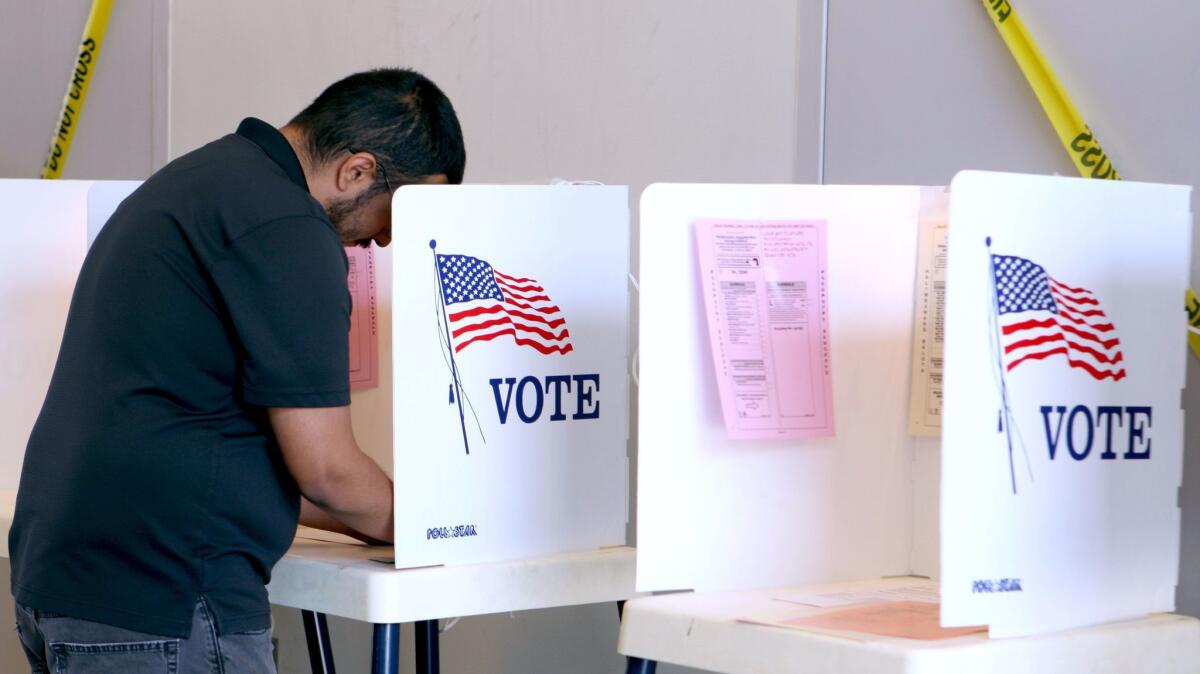Youth Council ponders Assembly proposal to lower California voting age to 17

In the state of California, 17-year-olds are prohibited from doing many things — marrying without parental consent, using tobacco, joining the military and buying or selling property — but should they be allowed to vote?
Last week, La Cañada Flintridge’s Youth Council was asked to discuss an assembly constitutional amendment that seeks to lower California’s voting age from 18 to 17.
Authored by Assemblyman Evan Low (D-Silicon Valley), ACA-10 would allow 17-year-olds to vote in all public elections, including federal elections for president and Congress. Supporters maintain younger voters would be more engaged in the electoral process than their 18-year-old counterparts, mainly because of their participation in senior-year government and history classes.
The proposal could also help reverse a decline in turnout among voters ages 18 to 24. In California’s 2014 general, only 8.2% of the state’s 3.5 million eligible youth actually voted, according to the California Civic Engagement Project, conducted by UC Davis’ Center for Regional Change.
On Wednesday, Low testified before the state Assembly Elections Committee on behalf of the proposal.
“We need bold, new ideas to reinvigorate the participation in our democracy,” said Low, citing low voter turnout in past statewide elections, particularly among voters ages 18 to 24. “An engaged electorate is crucial for a healthy democracy. A lower voting age can instill a lifelong sense of learning in adulthood, leading to greater civic participation.”
In a meeting of the La Cañada Flintridge Youth Council Friday, some panelists expressed skepticism that adding 17-year-olds to the voter pool would positively impact civic engagement.
Council member Kelly Steele, a 17-year-old La Cañada High School junior, recognized high school seniors might be more motivated, with support from teachers and parents, to vote than those who are 18.
But without a coordinated education and outreach effort to get young voters generally more engaged in the process, she said, lowering the voting age by one year wouldn’t likely be a meaningful solution.
“This is only going to be a Band-Aid solution for low voter turnout unless people are more educated about the elections, unless people know more of what’s going on,” Steele said.
St. Francis High School senior Christopher Hidalgo, 18, expressed concern younger voters might have even less knowledge about important issues than current voters. But fellow council member Lauren Risha, a 17-year-old Flintridge Sacred Heart junior, said a lower voting age might inspire students and schools to more actively participate in elections.
“I think some schools would see this as a good thing and maybe have debates about candidates or issues and encourage voting,” she said. “And maybe (students) would be more involved in learning about it if they knew that they could participate in civic life.”
Some panelists said they didn’t see what harm passing ACA-10 would bring. But 17-year-old Flintridge Preparatory School senior Nathan Gi said that in state politics, time spent passing a bill that wouldn’t make a positive effect would be a waste.
“I’ve had the opportunity to see what it’s like for a bill to get passed at the State Capitol — it is tough,” Gi said. “[A proposal] shouldn’t be no-harm, no-foul. It should be something with good intentions.”
The council made no recommendation to support or oppose ACA-10, instead submitting their viewpoints to City Manager Mark Alexander and Mayor Mike Davitt for consideration.
It is now up to Davitt to decide whether the City Council will discuss the matter in a future meeting, or return it to the Youth Council for a formal recommendation. If ACA-10 passes the state Assembly and Senate, it could come before voters in 2018.
Twitter: @SaraCardine
